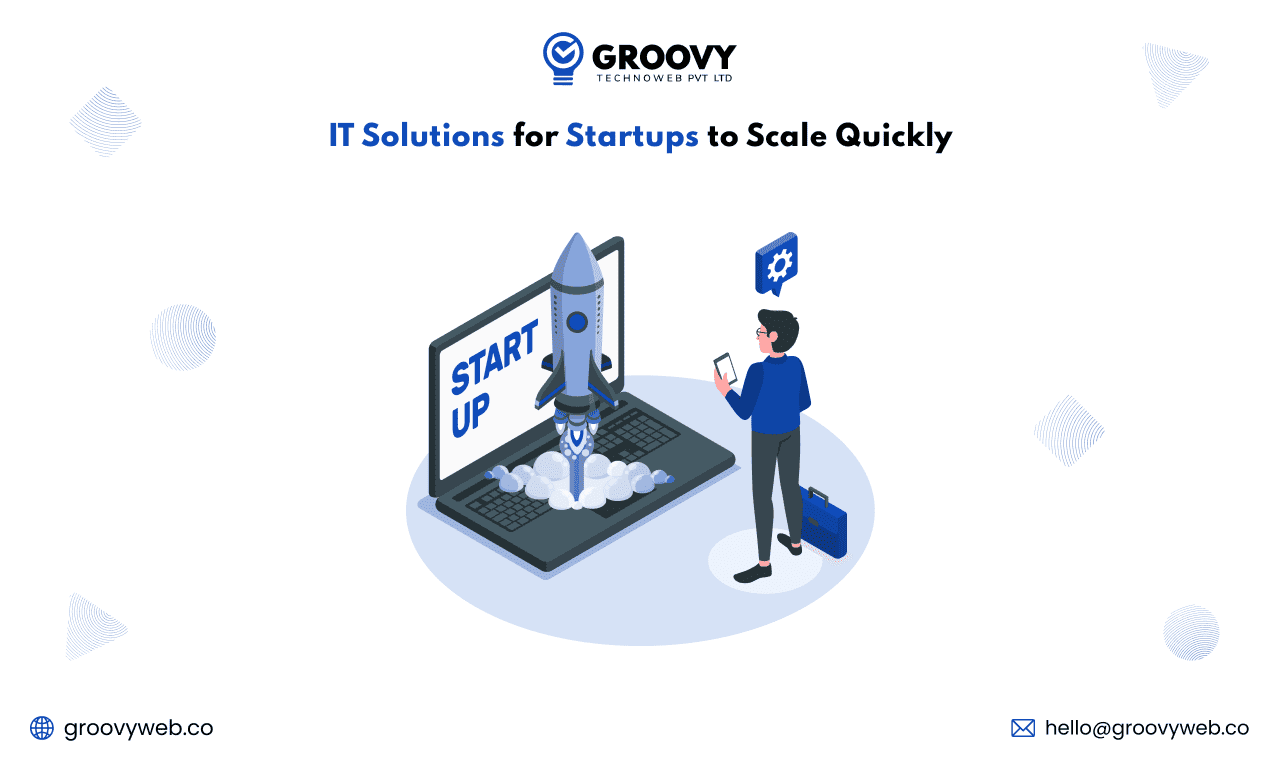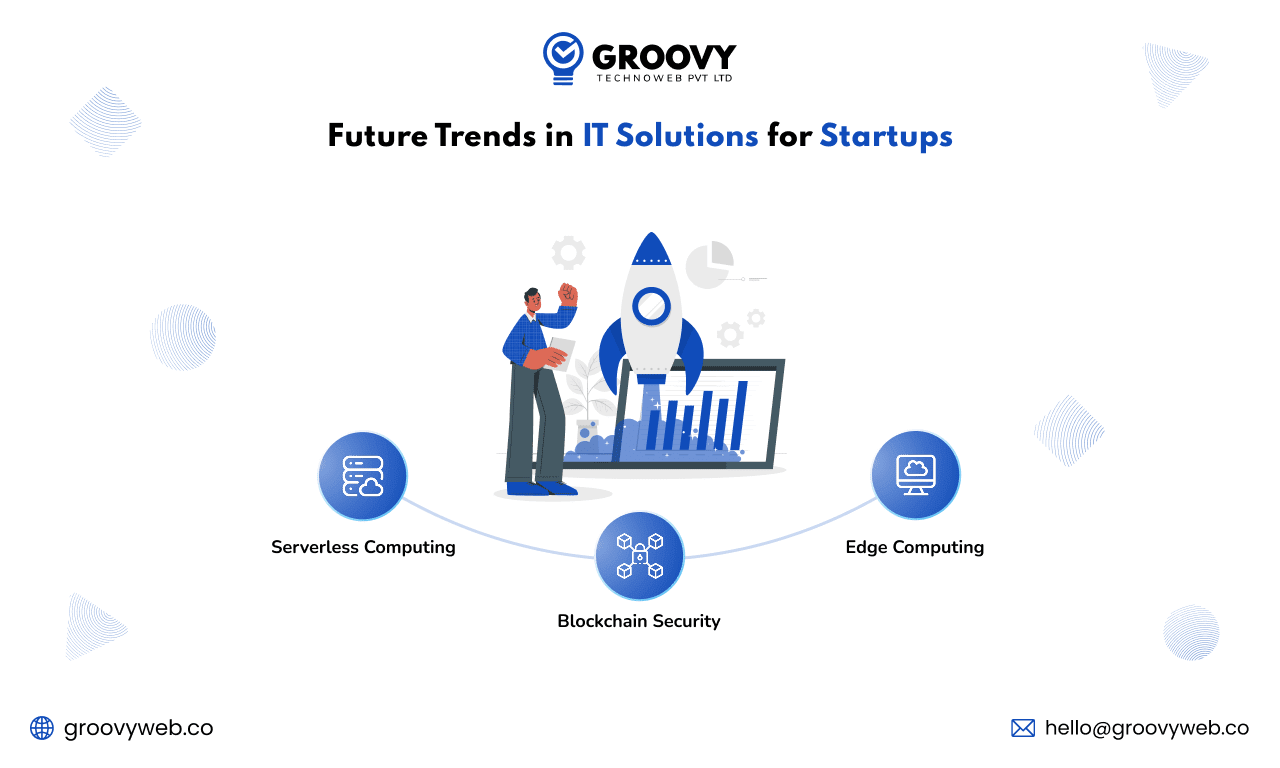5 IT Solutions for Startups to Scale Quickly
Krunal Panchal
April 08, 2025 21 Views
Quick Summary : Startups need the right IT solutions for startups to scale quickly and efficiently. Cloud computing ensures flexibility and cost-effectiveness, enabling seamless data storage and remote access. Scalable web and mobile applications enhance customer engagement while automation tools streamline operations, reducing manual efforts. Cybersecurity solutions protect sensitive data and maintain trust. Lastly, data analytics helps businesses make informed decisions for growth. By leveraging these IT solutions, startups can enhance productivity, improve customer experience, and adapt to market demands, ensuring sustainable expansion in a competitive landscape.
Startups face unique challenges when it comes to scaling efficiently. Without the right technology, growth can become slow and unmanageable. IT solutions for startups provide the necessary infrastructure, security, and automation to ensure seamless expansion. From cloud computing to cybersecurity, leveraging these technologies enables businesses to stay competitive.
This guide explores five key startup IT services that help new businesses scale efficiently. By implementing these scalable IT solutions, startups can enhance productivity, improve customer engagement, and ensure data security. Whether you’re in the early stages or expanding rapidly, these solutions will drive sustainable growth.
Why Cloud Computing?
For startups, investing in traditional IT infrastructure can be expensive and restrictive. Cloud computing offers on-demand, flexible, and cost-efficient IT solutions for startups. By scaling resources as needed, businesses only pay for what they use, which helps them manage costs effectively while growing quickly. To ensure efficient operations and long-term scalability, cloud services are essential to startup IT services.
1. Popular Cloud Platforms
Several cloud platforms cater to scalable IT solutions, offering flexible, enterprise-grade services tailored to startups:
- Amazon Web Services (AWS): Provides comprehensive cloud solutions ideal for scalable IT solutions with flexible pricing models.
- Google Cloud Platform (GCP): AI-driven solutions with robust tools to scale infrastructure and enhance operational capabilities.
- Microsoft Azure: A well-secured, scalable platform offering enterprise features ideal for startups seeking to expand. Each of these platforms delivers the power and flexibility that are essential for SaaS scaling strategies.
Key Benefits
- Cost Efficiency: With startup IT services like AWS and GCP, startups only pay for what they use, significantly reducing infrastructure costs.
- Scalability: Cloud computing provides the ability to quickly scale computing power, storage, and bandwidth to meet growing demands.
- Security and Reliability: Cloud providers offer enterprise-grade security features, including automated backups and disaster recovery options.
- Remote Collaboration: Cloud-based tools empower remote work, enhancing productivity and supporting collaboration across various teams and locations.
How Cloud Computing Helps
Cloud-based IT solutions for startups allow businesses to focus on growth without worrying about IT infrastructure limitations. These solutions foster greater flexibility, ensure high availability, and provide access to powerful tools for agile development. With cloud services, startups can quickly implement SaaS scaling strategies, making them agile, competitive, and adaptable to market demands.
2. Cybersecurity Solutions for Data Protection
Why Cybersecurity is Crucial for Startups?
As startups grow, they become prime targets for cyber threats. Data breaches can lead to reputational damage, financial losses, and legal complications. Implementing scalable IT solutions for cybersecurity ensures that sensitive data remains protected, allowing startups to operate without security concerns and focus on growth without fear of data theft or hacking.
Essential Cybersecurity Measures
- Firewalls & Antivirus Software: Firewalls and antivirus software protect systems from malware and hacking attempts, crucial for the security of startup IT services.
- Multi-Factor Authentication (MFA): MFA adds an extra layer of security for user access, safeguarding sensitive data from unauthorised access with scalable IT solutions.
- Encryption & Secure Networks: Encryption ensures that sensitive information remains unreadable to unauthorised parties, creating secure environments for your SaaS scaling strategies.
- Regular Security Audits: Conducting regular security audits helps identify and address vulnerabilities, ensuring compliance with industry regulations through agile development and secure startup IT services.
- Endpoint Protection: Endpoint protection secures all devices connected to the company network, protecting against malware and ensuring safe operations, especially crucial for startup IT services.
Top Cybersecurity Solutions
- Norton Security: Norton offers top-tier endpoint protection, preventing malware attacks and safeguarding data, an essential part of IT solutions for startups.
- Cloudflare: Cloudflare provides DDoS protection and website security, ensuring your startup’s online presence remains secure against cyberattacks.
- CyberArk: CyberArk offers secure identity management, keeping user access and sensitive data safe, a vital component of scalable IT solutions for startups.
How Cybersecurity Helps
By implementing strong cybersecurity measures, startups can prevent cyberattacks and ensure compliance with industry regulations. With robust startup IT services, businesses can protect customer and business data, building trust while scaling securely. These protective measures ensure that operations continue smoothly while maintaining the integrity and confidentiality of sensitive information.
3. CRM Software for Customer Management
Why CRM Matters for Scaling Startups?
Customer Relationship Management (CRM) software centralises customer data, automates sales processes, and enhances customer interactions. Startups need CRM systems to manage leads, track customer engagement, and streamline sales workflows. A well-implemented CRM strategy contributes to agile software development by allowing businesses to adjust to customer needs quickly. It also integrates with scalable IT solutions to enable business growth.
Top CRM Platforms
- Salesforce: Known for advanced automation features, Salesforce is ideal for large-scale customer management. It supports startup IT services by offering robust reporting and integration options.
- HubSpot CRM: This user-friendly platform is perfect for small startups. HubSpot provides a scalable solution that grows with your needs, enhancing your IT solutions for startups.
- Zoho CRM: Affordable and customisable, it offers startups the flexibility they need for efficient customer management. It supports scalable IT solutions to ensure smooth operations.
Benefits of CRM Implementation
- Automated Lead Tracking: CRM systems allow startups to efficiently track leads and automate follow-ups, boosting conversion rates with agile software development lifecycle
- Personalised Marketing Campaigns: Using CRM, startups can create personalised campaigns that enhance customer engagement and retention, aligning with SaaS scaling strategies.
- Improved Customer Support: CRMs ensure quick query resolution, offering enhanced customer support that keeps businesses agile and responsive to changing demands.
How CRM Helps Startups
By integrating CRM solutions, startups can adopt agile development approaches, enabling them to adjust marketing and sales strategies based on customer insights rapidly. CRM enables startup IT services to be more effective and responsive. It ensures better customer retention, streamlined operations, and sustainable growth while leveraging scalable IT solutions.
4. AI and Automation for Efficiency
How AI and Automation Help Startups?
Artificial Intelligence (AI) and automation can significantly reduce manual workload, allowing startups to focus on strategic growth. By integrating scalable IT solutions for automation, startups can enhance efficiency, make better decisions, and improve customer experiences while managing operational costs. Automation ensures smoother workflows, freeing up valuable resources and driving faster growth.
Key Areas of Automation
- Marketing Automation
AI-powered tools help schedule social media posts and personalise email marketing campaigns, increasing engagement and reducing manual effort in marketing. This boosts brand visibility and customer acquisition with scalable IT solutions. - Chatbots & Virtual Assistants
AI-driven chatbots and virtual assistants provide 24/7 customer support, handling queries efficiently. This improves customer satisfaction and reduces the need for manual intervention, allowing startups to offer seamless customer experiences with minimal overhead. - Workflow Automation
Automating repetitive tasks within the workflow reduces human error and enhances productivity. Scalable IT solutions enable seamless platform integration, allowing startups to optimise internal processes and improve overall efficiency.
Best AI and Automation Tools
- Zapier
Zapier automates workflows by connecting and integrating various apps, saving time and reducing manual intervention in day-to-day tasks. It helps startups with agile development and better operational flow. - UiPath
UiPath utilises AI-driven automation for business processes like data entry and workflow management. Its user-friendly interface makes it a go-to choice for startups looking for scalable IT solutions to improve operational efficiency. - Drift
Drift is an AI-powered chatbot designed to enhance customer engagement. Automating customer interactions reduces the time spent on inquiries, allowing businesses to provide personalised service with scalable IT solutions.
How AI & Automation Help Startups
Implementing AI-driven scalable IT solutions allows startups to operate with fewer resources while ensuring faster growth and better customer experiences. By leveraging these technologies, businesses can automate crucial tasks, reduce human error, and improve overall decision-making, leading to a stronger competitive edge. These solutions enhance productivity and enable startups to scale efficiently, leveraging SaaS scaling strategies and agile development methods to stay ahead in the market.
5. Scalable Web & App Development
Why Scalable Web and App Development?
As startups grow, their digital presence must evolve to meet increasing traffic and user interaction demands. Scalable IT solutions ensure websites and applications can handle growing user bases efficiently without compromising performance. With the right development approach, startups can provide seamless user experiences and be better prepared for expansion.
Best Development Frameworks
- MERN Stack (MongoDB, Express.js, React.js, Node.js): MERN Stack provides a complete full-stack app development solution for startups, enabling them to build scalable, high-performance applications quickly. It is one of the most efficient IT solutions for startups.
- MEAN vs MERN: MEAN and MERN are highly popular frameworks, but MERN is better suited for dynamic, modern applications. It offers flexibility and scalability, making it the go-to choice for many businesses seeking scalable IT solutions.
- React Native & Flutter: React Native and Flutter provide scalable mobile app development options. They enable startups to develop cross-platform applications with a native feel, ensuring high performance across devices. These tools are essential in agile development for startups looking to scale quickly.
Best Practices for Scalable Development
- Microservices Architecture: Microservices architecture allows independent scaling of different components within the application, providing flexibility and easier maintenance as businesses grow. This approach is crucial in scalable IT solutions, helping startups adjust to new demands.
- API-First Approach: An API-first approach allows businesses to build scalable and flexible systems with easy integration of third-party tools. This enhances the application’s overall functionality, aligning with SaaS scaling strategies.
- Cloud-Native Applications: Cloud-native applications ensure high availability and resilience. Using cloud platforms for deployment enables startups to scale quickly while keeping their apps available across geographies, a key aspect of scalable IT solutions.
How Scalable Development Helps
Adopting scalable IT solutions for startups, including agile development methodologies, enables businesses to grow and adapt quickly. Scalable development ensures that applications remain fast, responsive, and efficient, allowing startups to handle increased user traffic without performance issues. This allows for seamless growth and minimises risks as businesses scale.
Startups must stay ahead of technology trends to sustain long-term growth. Emerging IT solutions for startups include:
- Serverless Computing: Eliminates the need to manage backend infrastructure.
- Blockchain Security: Enhances transparency and data integrity.
- Edge Computing: Improves data processing speeds for real-time applications.
Adapting to these trends ensures that startups can implement the latest SaaS scaling strategies and remain competitive.
Conclusion
Scaling a startup requires the right combination of technology and strategy. Businesses can streamline operations and drive sustainable growth by leveraging scalable IT solutions like cloud computing, cybersecurity, CRM software, AI automation, and scalable web development.
Whether you’re just starting or planning expansion, integrating these startup IT services will position your business for long-term success. Investing in the right IT solutions today can lead to accelerated growth, higher efficiency, and better customer engagement in the future.
Written by: Krunal Panchal
Krunal Panchal is the CEO & Co-founder of Groovy Web. Krunal has been a hardcore programmer since he was 11 and started his professional career very young. His technical and logical mind drove him to choose coding as his destiny. At an initial stage, he got essential experience and the spirit of innovation and entrepreneurship. Learning something new is a never-ending process for him. Under his leadership, Groovy Web has become an established organization that serves industries from startups to enterprises, regardless of any limitations.
Frequently Asked Questions
We hope these clear your doubts, but if you still have any questions, then feel free to write us on hello@groovyweb.coWhy is cybersecurity important for startups?
Cybersecurity protects startups from data breaches and cyberattacks, which can result in financial losses and reputational damage. By implementing robust security measures like encryption, firewalls, and multi-factor authentication, startups can safeguard sensitive data and maintain customer trust.
How does CRM software help startups scale?
CRM software centralizes customer data and automates sales processes, allowing startups to improve customer relationships, track leads efficiently, and automate marketing campaigns. It helps scale operations by enhancing customer engagement, streamlining workflows, and providing valuable insights for growth.
What role do AI and automation play in startup growth?
AI and automation streamline repetitive tasks, improve decision-making, and enhance customer experiences. By automating processes like marketing, chat support, and workflows, startups can boost efficiency, reduce costs, and focus on strategic activities, fostering faster scalability and growth.
How does scalable web and app development benefit startups?
Scalable web and app development ensures applications can handle increasing traffic and users without performance issues. Using frameworks like MERN Stack and adopting cloud-native architectures allows startups to grow efficiently, ensuring seamless user experiences and adaptable business solutions.
Related Blog

Nauman Pathan
Top Fintech Trends 2025 - Shaping the Future of Finance
Mobile App Development 03 Apr 2025 10 min read
Rahul Motwani
7 Trends Shaping the Future of Wearable Technology and IoT App Development
Mobile App Development 06 Sep 2024 5 min readSign up for the free Newsletter
For exclusive strategies not found on the blog

